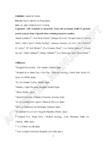Experience with Sunitinib in metastatic renal cell carcinoma (mRCC) patients: pooled analysis from 3 Spanish observational prospective studies

Use este enlace para citar
http://hdl.handle.net/2183/28112Colecciones
- Investigación (FCS) [1293]
Metadatos
Mostrar el registro completo del ítemTítulo
Experience with Sunitinib in metastatic renal cell carcinoma (mRCC) patients: pooled analysis from 3 Spanish observational prospective studiesAutor(es)
Fecha
2017-08-28Cita bibliográfica
Castellano D, Maroto JP, Espinosa E, Grande E, Bolós MV, Llinares J, et al. Experience with Sunitinib in metastatic renal cell carcinoma (mRCC) patients: pooled analysis from 3 Spanish observational prospective studies. Expert Opin Drug Saf. 2018:17(6):573-579
Resumen
[Abstract] Background: A pivotal, randomized, phase III trial demonstrated a statistically significant superiority of sunitinib over interferon-α in metastatic renal cell carcinoma (mRCC) patients.
Objective: To evaluate the effectiveness and safety of sunitinib in patients with advanced or mRCC in routine clinical practice.
Methods: Retrospective pooled analysis of clinical data from three observational and prospective studies carried out between 2007 and 2011 in 33 Spanish hospitals. Tumor response, Progression-free survival (PFS) and overall survival (OS), and main sunitinib-related toxicities were registered.
Results: 224 patients were analyzed. Median PFS 10.6 months (95% CI: 9.02–12.25), median OS 21.9 months (95% CI: 17.2–26.6). Objective response rate (ORR) 43.8% (95% CI: 36.8–50.7). Median time to PR was 3.8 months (95% CI: 3.86–5.99) and to CR 8.2 months (95% CI: 4.75–9.77). The most common ≥ grade-3 AEs were asthenia/fatigue (18.7%), hand-foot syndrome (6.2%), hypertension (5.8%) and neutropenia (4.8%). Hand-foot syndrome, diarrhea and mucositis were confirmed as independent predictors for PFS and/or OS in a multivariate analysis (p < 0.05)
Conclusions: Outcomes with sunitinib in daily clinical practice resemble those obtained in clinical trials. Long-term benefit with sunitinib is possible in advanced RCC patients but the appropriate management of toxicities is mandatory to enable patients to remain on treatment.
Palabras clave
Effectiveness
Routine clinical practice
Safety
Sunitib
Routine clinical practice
Safety
Sunitib
Versión del editor
Derechos
This is an accepted manuscript of an article published by Taylor & Francis in "Expert Opinion on Drug Safety", avaliable online at Taylor & Francis Online web.
ISSN
1474-0338





